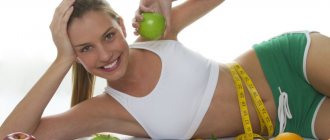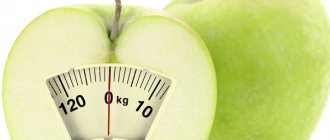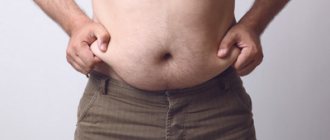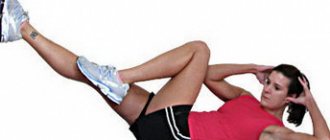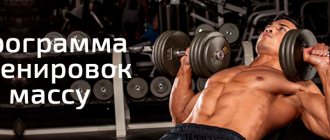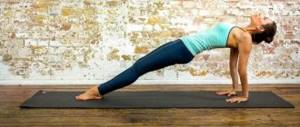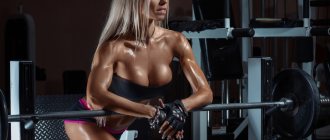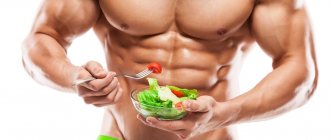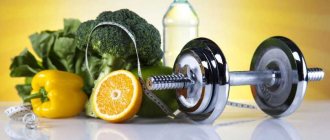The concept of “fitness nutrition” does not represent a limited complex with rigid boundaries; this style of nutrition can be attributed more to proper nutrition than to a certain diet or system, such as strict cutting, keto diet, and the like. Therefore, it is very simple to master and put into practice simple nutrition rules when doing fitness, and most importantly, an effective weight loss scheme does not require strict restrictions and it is almost impossible to fail.
The role of pre-workout nutrition for weight loss
The goal of your pre-workout meal is to give your body the energy it needs so you can perform at your best without feeling heavy in your stomach. If you don't eat right, you may become fatigued quickly, which will affect the intensity and duration of your workout. It also leaves you hungry after you've finished your workout, and lack of energy can burn muscle rather than fat. Active men and women can safely lose weight by consuming 1,500 to 1,800 calories per day; the more you weigh, the fewer calories. When losing weight, meals should be frequent , at least 5-6 times a day, without waiting for the feeling of hunger.
Fasting slows down your metabolism at a time when you need to speed it up.
Diet options for emergency weight loss with exercise
Let's find out how to eat to lose weight quickly. There are many diet options, but they can be dangerous to your health, so it is important to carefully monitor your well-being.
Emergency diet options:
| Diet name | The essence | Result |
| Cucumber | The basis of the diet is cucumbers. In addition to this vegetable, you can eat low-fat fermented milk products, fruits, berries, and other vegetables. An athlete can eat stewed cabbage with cucumber salad, drink a vegetable smoothie, and have 1 fresh cucumber and an apple for dinner. | In 3 weeks you can reduce weight by 5-15 kg |
| Kefir | You can only consume kefir, preferably no more than 2.5% fat content. | From 5 to 10 kg in 10 days |
| Citrus | It is allowed to eat grapefruits, oranges, pomelo, etc. They can be eaten fresh, made into juices or salads. | Up to 7 kg per week |
| Dairy | The basis of the diet is skim milk. It is also allowed to eat natural yoghurts, kefir, cottage cheese (with zero fat content). | Up to 2 kg per week |
| Vegetable | Eat only vegetables 5 times a day, a portion of food does not exceed 280 g. Foods can be boiled, steamed, baked (without oil) or eaten raw. There are a lot of vegetables, so the diet is quite varied. | Up to 10 kg per month |
| Emergency | In the first week, drink only low-fat kefir, the next 5 days - fresh vegetables or berries, then a one-day hunger strike follows. The remaining 5 days are allowed to consume vegetable or meat (low-fat meat) broths. Requires a gradual return to the regular menu. | Up to 15 kg |
Carefully! You cannot follow a citrus diet for more than a week, as there is a risk of damage to the mucous membrane of the digestive organs.
There is another option for a strict hunger strike, during which a person eats light plant foods for 1 day, and on the second day drinks only water. The fast lasts 2 weeks and allows you to lose about 15 kg.
It is important to properly combine nutrition and exercise. If the diet is very strict, then the athlete should perform simple, low-impact exercises. With a varied diet (for example, a vegetable diet), the intensity of the training can be increased.
Before following a diet, you should consult your doctor, as many of them are dangerous to health. Hunger strikes threaten exhaustion of the body, exacerbation of chronic diseases, and deterioration in the functionality of many organs.
Pre-workout food for weight loss
What you should eat depends on when you exercise. Ideally, you should eat a healthy, balanced meal, which means a mixture of carbohydrates, protein and fat, about two hours before your workout. Before training before 16.00 you need to consume 45 g of carbohydrates and 25 g of protein.
List of what you can eat before training to lose weight:
- chicken or turkey;
- whole wheat cereals or bread;
- apples or oranges;
- low-fat yogurt;
- whole wheat pasta with salad;
- baked potato;
- vegetables;
- low fat cheese.
How to eat to lose weight effectively
Proper nutrition when playing sports requires following these recommendations:
- Do not go on strict diets, this is fraught with exhaustion of the body and a decrease in athletic achievements.
- Create a calorie deficit; the menu needs to be reduced by 500 kcal or spent during training.
- If you want to increase muscle mass, then supplement your diet with proteins.
- Eat at least 5 times a day with an interval of 3 hours, but in portions not exceeding 280 g.
- Don't skip breakfast, because the first meal is the most important. Higher calorie foods should be consumed in the first half of the day; dinner should be light.
- Replenish your menu with lean proteins, complex carbohydrates, and vegetable fats.
- Eliminate fatty, fried, spicy, salty foods, processed foods, fast food, confectionery, etc. from your diet.
- Avoid alcohol, soda, and tonic drinks (coffee, strong tea, cocoa).
- Drink 2 liters of water in small portions throughout the day.
- Limit the amount of sugar.
Important! You can supplement proper nutrition with vitamin and mineral complexes.
It is very important for an athlete to know how to eat before, during and after training.
Before training
About 2 hours before exercise you need to consume proteins. An athlete can prepare a protein drink. Meals should be light and contain a minimum amount of calories:
- Oatmeal based on milk and water (1:1), egg white omelette.
- Boiled brown rice, a piece of lean meat, a slice of bran bread.
- Steamed fish, boiled potatoes.
A full meal should occur no later than 2 hours before the training. If you can’t eat a full meal, then half an hour before class you can snack on fruits or berries with a low glycemic index, for example, an apple or strawberry, or low-fat dairy products.
During class
Of course, you shouldn’t eat during training, but you need to drink water. The athlete can drink liquid whenever he feels thirsty.
Carefully! If you experience dry mouth, severe fatigue, or dizziness, immediately stop training, drink water and rest. This is how dehydration manifests itself.
Before class, drink 220 ml of still mineral water. When training, drink liquid in small sips at intervals of 15 minutes. In addition to water, you can consume fresh juices made from fresh fruits or berries. But if you are overweight, it is better to stick to regular or mineral water.
If the class lasts longer than 60 minutes, then prepare a protein shake.
After the training
After the gym, the athlete should eat protein and carbohydrate foods no later than 2 hours later. They will help compensate for wasted energy, relieve hunger, speed up metabolism, fat burning, recovery and muscle growth.
The following dishes will help compensate for protein concentration after training:
- Boiled lean meat.
- Omelet without yolks.
- Steamed fish.
- Low-fat sour milk.
The best sources of complex carbohydrates are natural cranberry or grape juice.
Important! It is forbidden to consume fats within 2 hours after training.
Best Products
Nutritionists and fitness experts advise supplementing your diet with the following foods:
- Milk and milk products with a fat content of 2-5%.
- Brown rice, pearl barley, buckwheat, oatmeal.
- Egg whites.
- Fresh juices from fresh vegetables and fruits.
- Meat of chicken, turkey, rabbit, etc.
- Lean fish.
- Seafood.
- Vegetable oils.
- Nuts, seeds (small amount).
- Greenery.
- Seasonal vegetables, fruits.
Whole grain bread and grade A pasta are valuable sources of complex carbohydrates.
Forbidden food
To speed up fat burning and increase muscle mass, the athlete needs to give up the following foods:
- Fatty duck, pork, goose, lamb.
- Halibut, sturgeon, sardines and other very fatty fish.
- Semi-finished products, fast food.
- Canned food, marinades, pickles, smoked meats.
- Pastries, cream products, ice cream, etc.
- Store-bought sauces.
- Millet flour products.
- Snack products (chips, crackers).
- Fat milk and products made from it (more than 6%).
Also, athletes are strictly not recommended to drink alcohol.
Menu option for the day
When doing fitness, an athlete can eat as follows:
- Breakfast – omelet without yolks or stewed vegetables, whole grain toast with nut butter, green tea.
- Lunch – soup in vegetable broth with cereal, buckwheat in water, a piece of boiled meat, compote.
- 2 hours before training – cottage cheese with dried fruits.
- After classes - vegetable stew.
- Dinner – a glass of natural yogurt, biscuits.
The menu should be varied, the main thing is to use products from the list of permitted ones.
Nutrition before morning workout for weight loss
If you exercise in the morning , you may not have the two hours needed to fully digest your food, in which case you may be better off eating an easily digestible protein 30 minutes before your workout:
- hard-boiled egg and bread;
- or low-fat yogurt with cottage cheese.
Foods high in fat and fiber are difficult to digest and should be avoided right before a workout.
If you have an hour or two before training, breakfast should in any case contain complex carbohydrates and proteins. For example, oatmeal with milk, cottage cheese with fruit. Breakfast is the most important meal of the day and should have a high energy value to further help the body burn fat rather than store it. Therefore, it is better to have a snack than to go hungry. In addition, cut the calorie content of your meals in the evening, and in the morning you will wake up with a good appetite .
The importance of proper diet during intense training
Nutrition during fitness is not a strict diet, but a complete, varied menu. The basis of an athlete’s diet is proteins and carbohydrates. For proper functioning of the body, you should consume vegetable fats.
Products high in protein must be in an athlete’s diet. These substances stimulate metabolic processes and are involved in muscle building. With a lack of protein, muscles cannot grow and strengthen. Protein food is necessary, even if a person wants to lose weight, it speeds up metabolism and the fat burning process.
Complex carbohydrates are necessary to restore energy reserves. With a lack of these nutrients, the athlete feels constant fatigue and exhaustion. Then the effectiveness of the training decreases, which negatively affects sports results.
Important! If your goal is to lose weight, then you need to limit the amount of simple carbohydrates as much as possible. They can be consumed in minimal quantities after training.
When playing sports, it is recommended to reduce the amount of foods rich in animal fats. It is better to replace them with substances of plant origin. You shouldn’t completely give up fats, as they are necessary for the normal functioning of many body systems. In addition, these nutrients in minimal quantities promote fat burning.
It is also necessary to maintain a drinking regime during training. Plain water stimulates the intestines, promotes the absorption of nutrients, improves the motility of the digestive organs, and accelerates the elimination of toxic substances.
This is interesting! To speed up metabolic processes, improve the functioning of the gastrointestinal tract, and stimulate fat burning, you need to consume water and fiber.
Be sure to check out:
Fitness for the abs at home and in the gym Fitness for beginners: competent workouts for a toned figure and healthy body Fitness at home: a sporty and toned figure Effective fitness workouts for losing weight
What to eat before training to lose weight in the evening?
For those who are losing weight, consumption of simple carbohydrates in the evening is prohibited . Sugar in any form (fruits, dried fruits, sweets, flour) will accumulate as fat. Even if you train hard, it is better to consume complex carbohydrates before training, but no later than 16.00 . This way, you will have the strength to train, and sugar will not be stored in fat.
Bodymaster.ru recommends Fitness Trainers:
11 Squat with heavy weight. With proper technique, more muscles are used. The stronger the muscles, the more effective fat burning occurs.
12 Pump up your abs with heavy weights. Instead of the usual few reps, try doing a couple of sets with maximum weight.
13 Combine cardio and strength training. Jump rope between sets, or incorporate some exercises into your circuit training.
Intense Cardio
The process of fat lipolysis, that is, the conversion of fats into energy that your body will consume to ensure a calorie deficit, occurs under the influence of oxygen. This means that the more you breathe, the more intensely you breathe, the more calories you burn, the more body fat you can burn.
From this we can conclude that intense cardio is the best option in order to expend the maximum amount of energy and burn the maximum amount of fat. However, regarding the heart rate zone, some believe that there are certain zones (for example, heart rate from 110 to 120 beats per minute) in which fat is burned most intensively.
However, there is no direct scientific evidence for this and should be taken with skepticism. It’s better to do intense cardio without getting out of breath, without bringing yourself to the point where your heart will burst out of your chest, but at the same time work, not rest.
Use of sports supplements in fitness
Sports nutrition is another category of nutrition for weight loss during fitness training. It’s hard to imagine modern sport without him. The use of various vitamin and mineral complexes will help fill the deficiency of the body in need. Protein will supplement or balance the amount of protein in food, and creatine will fill the missing energy immediately before training.
The use of sports supplements cannot replace a good diet - only supplement or diversify. In addition, this will help you quickly achieve the desired results and correct your figure.
